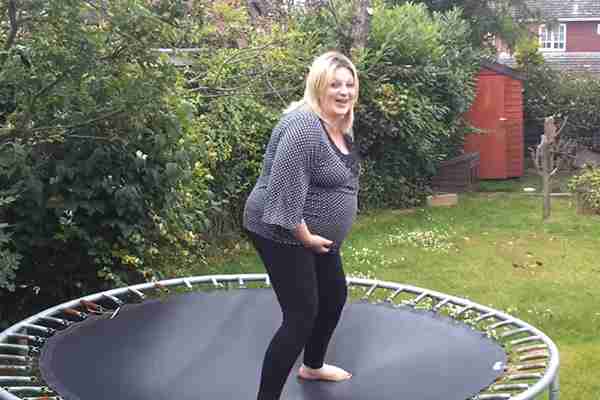Last Updated on January 6, 2025
Jumping on a trampoline while pregnant is not recommended due to the risk of falls and impact on the uterus. Pregnant women should avoid any activity that increases the risks of injury or causes discomfort.
If you are pregnant and seeking ways to stay active, you may wonder if jumping on a trampoline is a safe and fun activity. However, it’s crucial to know that there are risks involved with jumping on a trampoline while pregnant. Although trampolines are a great way to have fun and stay active, they also present a high risk of falls and injuries. Moreover, trampolining might cause too much pressure on the uterus, leading to potential health problems. In this article, we will explore in detail why jumping on a trampoline during pregnancy is not recommended, and discuss some safer alternatives to try instead.

Credit: www.gettrampoline.com
Is It Safe To Jump On A Trampoline While Pregnant?
Can You Jump On A Trampoline While Pregnant?
Pregnancy is a delicate time when women must take extra precautions due to the many changes that take place in their bodies. They must be careful when engaging in various activities, including those that require physical activity. One such activity that many people do not consider the risks of during pregnancy is jumping on a trampoline.
Related: Can You Take Zicam While Pregnant?
Discuss The Risks Of Jumping On A Trampoline During Pregnancy, Including Potential Strain On The Abdominal Muscles And The Possible Risks Of Falls.
Jumping on a trampoline while pregnant can cause strain on the muscles, particularly the abdominal muscles and pelvic floor. This can lead to discomfort and in some cases, injury. Pregnant women also have a higher risk of falls due to changes in their center of gravity and the added weight they carry.
A fall from a trampoline can cause serious harm to both the mother and developing fetus.
- Strain on abdominal muscles and pelvic floor during trampoline activity
- Increased risk of falls due to changes in center of gravity and added weight carried during pregnancy
Mention The Potential Impact Of Jumping On A Trampoline On The Developing Fetus.
Jumping on a trampoline while pregnant can have several potential impacts on the developing fetus.
- Increased stress on the fetus due to rapid movements
- Risk of injury from falls
- Possible damage to fetal organs due to impact
Mention The Risks Of Acute Injury Associated With Trampoline Use.
Acute injuries due to trampoline use can range from minor to severe, regardless of whether the person jumping is pregnant or not.
- Sprains and strains
- Fractures
- Dislocations
- Head and neck injuries
Jumping on a trampoline during pregnancy poses unnecessary risks that can cause harm to both the mother and developing fetus. As a result, it is advisable to avoid or limit trampoline activities during pregnancy.
Alternatives To Jumping On A Trampoline While Pregnant
Jumping on a trampoline can be tons of fun as well as a great workout. However, for pregnant women, this can be a risky affair as it can pose a threat to them and their unborn child. The good news is that there are alternatives to trampolining exercises that offer similar benefits and can be performed in a safe manner.
Here are some exercises to help improve balance, coordination, and cardiovascular health that are suitable for expectant mothers.
Suggest Alternative Exercises That Pregnant Women Can Engage In That Offer Similar Benefits To Trampolining.
- Walking: walking is a simple yet effective way for pregnant women to maintain their fitness and stay active. It is also a low-impact exercise that doesn’t put undue pressure on the joints, making it safe to perform during pregnancy.
- Swimming: swimming is an excellent workout for pregnant women as it provides a full-body workout while reducing the pressure on the knees and ankles. It can also help alleviate some of the common pregnancy discomforts, such as back pain and leg swelling.
- Prenatal yoga: yoga is a great way to improve flexibility, balance, and coordination. Joining a prenatal yoga class specifically designed for pregnant women can also help reduce stress and prepare the body for childbirth.
- Stationary cycling: stationary cycling is a low-impact exercise that helps strengthen the legs and improve cardiovascular health, making it a great alternative to trampolining.
Related: Can You Eat Burrata When Pregnant?
Describe Exercises That May Help Improve Balance, Coordination, And Cardiovascular Health.
- Squats: squats can help improve balance, coordination, and strengthen the legs, making it an ideal exercise for expectant mothers. It is also a great way to prepare the body for childbirth.
- Kegel exercises: kegel exercises help strengthen the pelvic floor muscles, which can help ease labor and delivery. It can also help alleviate some common pregnancy discomforts such as urinary incontinence.
- Planks: planks are a fantastic way to strengthen the core muscles, which help with balance and coordination. It is also a low impact exercise, making it safe for pregnant women to perform.
Provide Resources For Finding Prenatal Fitness Programs That Cater To These Needs.
- American pregnancy association: the american pregnancy association website provides resources, advice, and articles for pregnant women on prenatal health, nutrition, and fitness.
- Fitfortwo: fitfortwo is an online resource that offers prenatal workout programs for expectant mothers of all fitness levels.
- Babycenter: babycenter offers tips and advice on pregnancy health and fitness, as well as prenatal workout programs that are tailored for pregnant women.
It’s important for pregnant women to maintain their fitness and stay active, but it’s equally important to do it in a safe and healthy manner. These alternatives to trampolining exercises are perfect for those who want to stay fit and active during pregnancy while avoiding any risk to their unborn child.
With these safe yet efficient exercises, pregnant women can maintain their health and fitness while preparing for the birth of their little one.
Related: Can You Drink Liquid Iv While Pregnant?
Frequently Asked Questions Of Can You Jump On A Trampoline While Pregnant?
Is Jumping On A Trampoline Safe During Pregnancy?
Jumping on a trampoline during pregnancy is not recommended as it can cause harm to the fetus and also pose a risk of falling or injuring yourself.
What Are The Risks Of Jumping On A Trampoline While Pregnant?
Jumping on a trampoline while pregnant can lead to accidents, falls, and injuries, which could be dangerous for the mother and the developing baby. Additionally, the bouncing motion could strain the joints and ligaments, which are already under stress during pregnancy.
How Does Jumping On A Trampoline Affect Pregnancy?
Jumping on a trampoline during pregnancy can affect the developing fetus and cause harm to its fragile organs. Also, the motion generated while jumping can lead to premature birth and other complications.
Are There Any Alternatives To Jumping On A Trampoline During Pregnancy?
There are many safe and beneficial exercises that you can engage in during pregnancy, such as prenatal yoga, walking, swimming, and low-impact aerobics. These exercises can help you stay fit and healthy during pregnancy without putting you or the baby at risk.
Conclusion
Trampolining is an exciting and interactive activity that people of all ages enjoy. It has numerous health benefits, including improving cardiovascular health, bone density, and overall well-being. However, when you are pregnant, it is vital to approach trampolining with caution.
Regardless of whether you are a seasoned trampolinist or a beginner, it is advisable to speak to your doctor before deciding whether it is safe for you to jump on a trampoline while pregnant. Ultimately, jumping on a trampoline while pregnant can have various risks, and it is essential to prioritize both your safety and the safety of your unborn child.
As a rule of thumb, if in doubt, it is best to abstain from trampolining during pregnancy and wait until after giving birth to enjoy this fun activity once again. Overall, having fun is essential, but ensuring both you and your unborn child’s well-being is even more critical.











